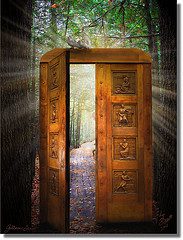 It is not news that people are leaving the Christian faith. Or that, increasingly, they were never a part of it. The staggering numbers of people that identify themselves as atheist, agnostic, or “spiritual but not religious” have us career Jesus people in a panic. Will there still be a community of faith in 20 years? In 50?
It is not news that people are leaving the Christian faith. Or that, increasingly, they were never a part of it. The staggering numbers of people that identify themselves as atheist, agnostic, or “spiritual but not religious” have us career Jesus people in a panic. Will there still be a community of faith in 20 years? In 50?
I’m starting to change my mind about the liklihood of a ‘yes.’ Because in my conversations with people, it is apparent that it isn’t God people have stopped believing in. It’s the Church. That is, big “C” Church, as a place of judgement, exclusion, guilt, shame, and/or inspirational stuff that politely excludes talk of poor people, gay people, racial tensions, and women who feel led to speak in public. In front of the men, even.
How have we let this happen? And by ‘we,’ I mean progressive, justice-seeking, hope-filled Christians. How have we let the big ‘C’ church speak for us for so long in culture, press, and mass media, that we are no longer a viable voice in public awareness?
The answer is simple. We’ve been too damn polite. Not just in recent memory, but for a couple of centuries… We’ve been too worried with our image, and fearful that an invitation to church sounds just like “hey, i think you are a sinner who’s going to hell for sure.” We’ve tried so hard to be inclusive, accepting, tolerant and open-minded, that we tolerated ourselves into decline. While we weren’t looking, the voices of judgment, exclusion, and silent alignment with the status-quo grabbed the bullhorn.
We let it happen.
But i am encouraged. I am encouraged that progressive people who love Jesus have started getting a little louder and less polite in our invitations to community and service. I’m encouraged that many of our mainline denominations have started ordaining openly gay and lesbian people to the clergy. I’m encouraged that people on both sides of the aisle are starting to realize that they aren’t comfortable with their politicians being also their preachers.
It also gives me hope that people like Rachel Held Evans and Christian Piatt are having open and candid conversations about what led them away from church…and what brought them back in again. (I would have even more hope if Rachel and Christian had more followers than, say, Mark Driscoll or Pat Robertson. But you know…baby steps.)
Ultimately, we’re taking our sweet-ass time about it, but we’re wrangling a bullhorn of our own. Or if not an obnoxious bullhorn, at the very least, a live mic. Something to amplify our small hope that congregational life–and the face of modern Christianity–might yet be transformed.
So…once people are listening, what should we say? How do we articulate, within the space of a short media buy, that there is another way to live faith in community?
Here are a few of the points that matter most to me, in the frame of an invitation. This list is by no means all-inclusive, nor do I claim to speak for all people everywhere… But in a few words, this is me grabbing the mic for a second.
You Might be a Progressive Christian if:
1. you want your faith journey to engage your intellect, rather than suppress it
2. you have friends who are Jewish, Muslim, Buddhist—or whatever—and you don’t think that they are going to hell.
3. you think there is something toxic and backward about silencing women. anywhere.
4. you think that gay, lesbian, bisexual and transgender people are fully human, and should be treated as such; especially in church
5. you identify yourself as LGBorT, and want to be fully included in the life of faith—just as you are
6. you have more questions than answers—and you are ok with that
7. you think that discipleship means concern for the poor, more than memorizing scripture
8. you feel that people who live simple, spiritual lives can transform the world more than the people with guns and bombs can
9. you believe that Democrats and Republicans should be able to worship together
10. you further believe that issues like immigration, racism, abortion, and gun control are complex and painful struggles of the human family; that none of our politicians has all the answers; and that a true community of faith should approach these matters with prayerful discernment and sensitivity…not quippy sound bites or political rhetoric
If you are nodding agreement on even a few of these points, then I’ve got good news for you: you are not alone. We are growing, and we are trying–not always well, but trying hard–to be a little bit louder.












